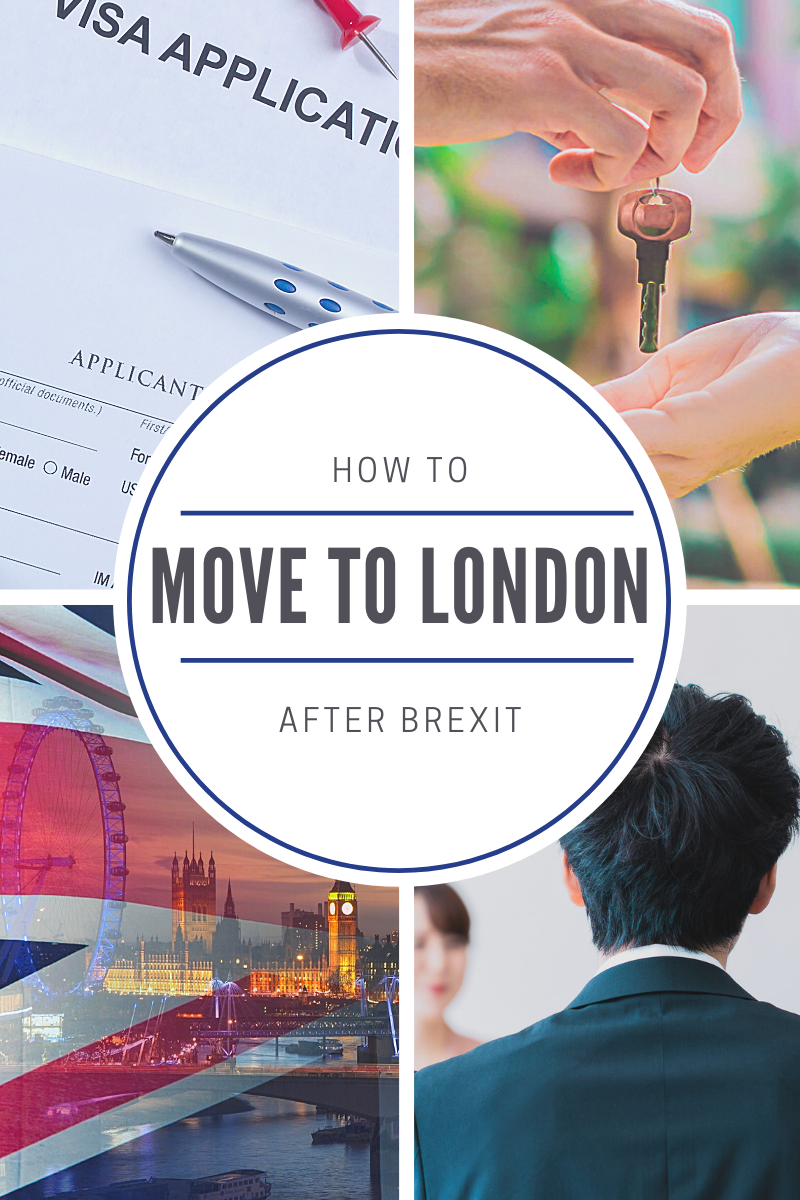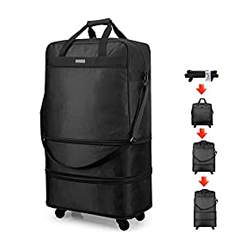How to move to London after Brexit: a Guide to a hassle free move!
February 11, 2021Many people have dreamed of moving to London, and that happens for a few reasons: maybe they're looking to start a new career, or progress in the one that they already have, looking to move to a multicultural place to broad up their knowledge and experiences or even just to start a new and exciting chapter of their lives by moving to a city that never sleeps - and so, you can't quite get bored of it.
First, you think about the possibility to move. And straight after, you start searching for the things that you need to do in order to be able to move to London - after all, how exactly are you going to do it?
And then, you land on this page.
And I am glad you did - because here, I will pack all of the knowledge I have about moving to the big city (just like I did back in 2015) and a few (many) updates on the current situation because, let's be real, it has been a while since my move and there's been quite some significant changes - the so called pandemic and the infamous Brexit *coughs*.
Disclaimer: this post may contain affiliate links, meaning I will get a commission if you make a purchase through these links, at no extra cost to you. This allows me to receive a compensation for the time and effort invested in creating the best content for you. Thank you for your support!Last updated: February 2021
If you're looking for reasons to move to London or even NOT to move to London, then make sure you check my blog post about 44 Things you should know before moving to London.
Now that you know that, it's time to move on. Let's get to the good stuff!
TABLE OF CONTENTSBefore you move in
Few weeks or days before your flight
Before you move in
As you might have guessed, there's a lot that you're gonna have to do before you move to London.
All of these steps are crucial to have a smooth experience moving in, so make sure you do not skip any, and I would highly recommend you to follow these in order.
I will also leave my YouTube videos where I cover all points mentioned on this blog so if you would like to follow the videos along instead of reading, you can do that. I have broken down the information on this post in three separate videos so do make sure to watch all of them.
1) Figuring out why you're moving and what you're going to do
This might sound like a silly point, but it's actually super important, and the next steps will totally depend on this first one. You will need to figure out why you want to move to London and what you plan on doing there. Ask yourself the following questions:
- Are you going for study or work?
- If you're going to study, which school / college / university are you going to? Do you need to take any special exam in order to enter (which you probably do)? Are you applying as a regular student or are you on a Student Exchange program? If you're on a Student Exchange Program, does the place you want to study in London has an agreement with the place you study in your hometown?
- If you're going to work in the UK, are you looking to start a brand new career or do you have any previous experience in the field? Are you going to work for someone else or be self employed? If you live overseas, will the UK accept your education and skills or will you need to take further training/education?
- Will you be on your own or do you have friends or acquaintances living in London?
Your visa requirements, housing situation and even savings will hugely fluctuate depending on your answers to the questions above.
If you're a STUDENT, you will need to sort out your entry exams (if applicable) before you do anything else. There's no point in going through all of the process if you can't pass the exams needed to get accepted in the institution you chose.
If you're going for WORK, it might be easier if you already work for a company that requires your services in London. Nevertheless, you can still apply for jobs online that are recruiting people to work over in London by sponsoring their working visas.
Yep, you heard me well - VISAS. The days when you could just come to London as a tourist and go job hunting for a week are kind of gone. Even as a EU citizen, you are now required to have a working visa to work in the UK, which means, you won't be able to work in London unless you get a company to hire you and sponsor your visa before you move in. Worse case scenario, someone can report you and you might even get banned from the UK for trying to get a job illegally. This won't happen, of course, if you're a UK citizen or you have the right to work in the UK. In that case, you can simply visit London and go job hunting until you find the one that you want.
As for self-employment, I am actually unsure of how that's going to work with this new immigration system, so I would advise you to do a great research around this.
When I moved here, I didn't need a working visa, which made it easy for me to just go around and deliver CVs (which was a quite common thing to do back in the day). The only issue with that was the fact that I wasn't aware that my qualifications (a three year Sports Science Bachelor!) weren't accepted, so I was forced to spend money and waste time taking courses that were clearly just a portion of my course, in order to be able to work as a PT again. Because this is now different, when applying online, you will be able to understand if your qualifications are accepted here in the UK or if you need to take further training - so have that in mind when looking for jobs online.
And then finally, if you have a friend or acquaintance that is going to let you stay over their place for a while until you sort your situation out, things like getting a bank account and house hunting will be less of a hassle.
2) Deal with your visa
If you're a UK resident or you have the right to work in the UK, this step will not be about getting a visa, but about informing yourself on what you need to do work or study wise.
Now that you know what you're going to do in London, you should also have an idea of what you need in terms of visa. If you're still unsure, a good place to start your research is the visas and immigration page on the UK Government website.
As I mentioned above, and according to their website, EU citizens can no longer get a National Insurance Number without a visa or a document proving their right to work in the UK.
This will be the phase where you will be taking care of the requirements for studying or working visas, as well as applying for them once you have met those requirements. This can be looking for job offers online (LinkedIn, Indeed and Totaljobs are good options) or taking care of whatever you need to in order to be able to study abroad.
3) Start saving up money
Once you have your visa and work/study sorted out (or at least relatively sorted out), you will need to start thinking about saving money.
London is an extremely pricey city, and if you're planning on moving here, you will need quite a lot of money in advance - unless you have a good old friend that is going to take care of you for a while, as I mentioned previously.
You will need to think about saving money for:
- Flight tickets and transportation from the airport to your accommodation (or any other means of transportation if you're not arriving via plane)
- Accommodation (enough to pay for your temporary accommodation or if you're renting a place straight away, enough to pay for 2 months and deposit if possible - so possibly three months worth of rent + any utilities and Council Tax if applicable - will talk more in depth about this in the topic of getting a house);
- Clothing and stuff that you are not able to bring over from your home town (things like towels, shower products, make up, clothing that you will be missing, kitchen utensils if necessary, etc.)
- Food, transportation and mobile services for 1-2 months
If you're on a budget and you can't save a lot of money, don't freak out: there will be options for you! Here are a few things that you can do:
- Stay at a friend or acquaintance's house for a while until you can find and pay for a place to live;
- If you don't know anybody in London, but can't save a lot of money either, look for room shares and split the cost of your room with some random (yes, I know, terrifying idea) just until you can pay for your own room;
- Get your accommodation near work so you don't have to waste money on public transportation;
- Shop at low cost supermarkets and get your clothing from charity shops or Primark.
4) Book the flights (or train, or bus...)
Now that you've got most of the important stuff sorted out, it's time to do the flight booking! This will give you an idea of how much time exactly you've got left, so that you can start planning your trip in advance instead of leaving everything for last minute.
London has 6 different Airports: Heathrow, Gatwick, Stansted, Luton, London City and Southend.
While it is true that some are more convenient then others to reach certain locations, if you don't have a place to stay just yet, I wouldn't worry too much about this, as trying to find a house way in advance just doesn't work in London. So unless you already have someone who is going to let you stay at their place, the location of the airport is kind of irrelevant.
If you're traveling by any other means, check their availability and book in advance if you have to.
5) Order a prepaid SIM Card
If you're a UK citizen or you already got a UK SIM Card and bank account, you can skip the next two steps. If you're a EU citizen, I would recommend you to check with your service provider to find out if the UK is included on your roaming plan or not.
Commuting in London is a pain in the ass if you don't have a Google Maps or Citymapper guiding you around, so having mobile data in this city is extremely important. To make sure you don't risk not having a way to guide yourself around to the destinations you want (including getting out of the airport to your accommodation), you should totally order a prepaid SIM Card, that can be shipped to your house so that you have it in advance.
You can use giffgaff for that and get a contract with a different provider once you arrive in London (and have time to do so).
6) Talk to your bank or get an online bank account
If you're using an international bank in your home country, there is a possibility that your bank also works in the UK, and if that's the case, maybe you could open up a UK bank account with them. If that isn't possible, you should be looking at using services like TransferWise or even get an account on a online bank such as Revolut or Monzo (Monzo being more popular in London, so I would recommend that).
Since it's a lot easier to open up an account in one of these online banks than getting an account in a regular bank in the UK as a foreigner, I would highly recommend you to try them (also, you will probably stick with them for when you travel anyways, thanks to their free-fee system).
Having a UK bank will be necessary for a lot of different things such as getting a house, a work contract or even use it as your "Oyster Card" (if it's contactless) for paying for public transportation.
7) Start organizing your stuff
If you're moving to London (which you are probably going to, since you're reading this), there's a high change you won't need any of your belongings - apart from your favourite clothing or any other items that are personal to you or absolutely necessary.
Houses are often furnished and you won't want to move to an unfurnished house unless you plan on living in there for a very long time (which you probably won't - will explain later why). But even if you do move to an unfurnished house, buying new (or used) furniture is probably going to cost you a lot less than shipping the furniture you already own, so you won't need much more than just one of two bags of belongings.
I would recommend to either store the things you already have and want to keep somewhere (like a friend's house, or your parents, or a storing unit), or sell them. You will be able to find anything you need in London, trust me.
But if you still want to ship some stuff over, you will either need an address to do so in advance (only possible if you know someone who is already living in London) or you're going to need someone else's help to ship the stuff once you're settled in London.
Also think about anything that you might need to sort out before your move: any bank accounts you no longer need, direct debits that you need to cancel, etc.
Few weeks or days before your flight
The following steps are only applicable few weeks or days before your flight.
1) Find a temporary housing

|
| Yes, your temporary housing might look like this if you're on a budget. But don't freak out just yet. |
Before you move to London, I would not recommend looking for the house of your dreams. Firstly because the house of your dreams will probably not be in London (or I mean, it will be but you won't be able to afford it - I'm sorry to break it to you), and secondly because you want to see the house yourself before signing any contract or paying anything for it. Housing scams are a thing and there's no point in securing a place you don't even know if it exists or if it offers what you've been promised.
"Oh, but I can just book a bunch of house viewings for my first day". Yes, you could. But not only you will be exhausted from your flight and wasting your energy on looking for a place to stay at last minute, but there will also be other people interested in those properties and in the end, you might not get any of them (because you didn't like the area or other people put in the offer first). Or even worse, choose a house you don't even like because it was the only option available and of course, you need a place to sleep at the end of the day. On top of that, it's also quite unlikely to get a viewing in the morning and be able to move in the evening, so you would still not have a place to sleep.
In summary, you will be much better off with finding a temporary solution for your accommodation so you don't regret any decision you do on a rush. This can be a friend's or acquaintance's house, a hostel, hotel, Airbnb or even a shared house (that again, you will see the house and sign the contract on the day of your arrival) where you can stay for a few months. You can easily find shared houses on SpareRoom, Gumtree and Facebook Groups.
I would recommend getting a house share instead of a hostel or hotel, as you're going to need a proof of address for things like opening a bank account and getting a GP.
2) Find potential interviews
This step will only be applicable to those who do not need a visa to work in the UK.
If you have the right to work in the UK but don't have a job yet, then you can start sending out CV's and find potential interviews (online or in person). Many jobs will require you to be available within days and that's why it is not the best to waste your time sending out CVs too ahead of time. I would say, maximum 2 weeks before your departure date you should starting looking for jobs.
If they require you to be in person for the interview, try to schedule as many interviews as possible for the day of your arrival or the one after. And if you don't get around booking any interview before the big day comes, don't stress: you will be able to find something in London, even if that's just a temporary work in hospitality, while you continue looking for your dream job.
3) Book the transportation from the airport or coach/train station to your accommodation
Once you know where you will be staying at, you will be able to book the transportation from the airport or respective station to the desired location. This will generally be by train or coach. While there are different options available, National Express is one of the most popular for many airports and even train or coach stations.
4) Pack the bags
It's time to pack the bags!! This can be a quite exciting, yet stressful step before your big move, so I came up with a Moving to London Packing list that you can download for FREE and use during your packing and later when you arrive, to make sure you're not missing anything.
I've included tips on what is essential to pack and what is not, and also where you can buy the things that are non essential when you arrive in London.
Click below to claim your free copy!
5) Take the flight
Eventually the big day comes, and it's time to finally take the flight towards your dream city!
Once in London
Once you step foot in one of the six London airports or any other station, reality will hit you and you can no longer ignore the fact that you're about to change your life drastically - and that's amazing! Embrace the anxiety, the excitement, the fears of living in a different city (and potentially country), and let's to do this!
These steps might have a different order for you because it will depend on loads of factors (such as being a UK resident or foreigner, having someone waiting for you or being on your own, starting work straight away or having to look for it, and so on), but I will order them in a way to make your life much easier.
1) Sort out transportation and SIM Card
This is only applicable if you didn't manage to get your online SIM CARD and/or didn't book the train/coach to your first location.
- Transportation: although you could take an Uber or a Taxi, the most preferred way to commute from the airport to any place around London is by coach or train, due to their difference in pricing. Train is generally faster, but often quite pricey comparing to coaches. If you haven't booked any ticket online, you will be able to find stands where you can book your tickets to the desired destinations. The price might be the same, but because you're buying on the spot, there is a chance that you will need to wait a bit longer in case the next available coach or train gets fully booked (which happens quite often, at least for coaches). If you're arriving by train or coach, there is a high chance that you will only need to use either bus, underground, overground or even train to get to where you want to. If that's the case, you will need to pay for your journey using a contactless or an Oyster Card;
- SIM Card: As I mentioned previously, London is a big city, and getting around without mobile data is a nearly impossible task. If you didn't manage to get a prepaid SIM Card, many Airports will likely have a stand (or even vending machine!) where you can get one. If you don't find it at this point, I wish you good luck finding the directions to the place you want to go 😝
2) Leave the bags at your temporary accommodation
First of all, you need to leave all of your luggage somewhere, because there will be loads of things to do the moment you arrive in London - so once you get to your temporary accommodation, leave the bags, learn anything that you need to learn and leave to do following (very important) errands.
Here is a list of things you might need to do when you arrive to your temporary accommodation:
- If you're going to stay at an Airbnb, hostel or hotel, check-in, get your keys and learn about anything you might need to know (towels, breakfast, check-out schedule, WiFi password, etc.);
- If you're meeting with a private landlord or agency, make sure you have a look at your contract (check if Council Tax and bills are included in the rent, how often you're expected to pay - weekly or monthly - double check when you can leave and what sort of notice you have to give, etc.), get your keys, pay for the deposit and rent upfront if applicable, and learn about the house (if it's a shared house, how many rooms you have, can you use the dishes or do you need to get your own, etc.).
3) Get a SIM card (last chance!)
If you already have a temporary SIM Card, you can get a more permanent card (potentially with a contract) once you're done with the more important errands, so you can skip this for now.
Yes, I know, this is the third time you're reading about "getting a SIM Card", and no, you don't need three. In case you didn't get a prepaid SIM Card, and the Airport you landed at didn't have cards available, you're going to want to look for a store to get one ASAP. Not only that, if you're going to stay, you should totally look into a contract rather than Pay as You Go (but that is absolutely up to you).
And to be fair, it's not going to be that hard. There is either a EE, O2, Three or Vodafone store almost anywhere - these are the most popular providers, and you can't go wrong with them. I have used EE since I arrived and I personally love it, but I know people who have used O2 since their arrival and they are also very pleased with it. So I would say that mobile phone providers are pretty similar when it comes to packages and services here in the UK.
Be ready to fill out some paper work, present your passport, and get your SIM Card!
The following four points can have different orders, according to your current situation. If you will be moving straight away to a place you plan on staying for a while, getting a house will not be an urgent task. If you've been already approved onto a job, getting a job will not be applicable to you. And finally even though getting a GP should be a priority, because you will be getting one in a specific medical centre, and it will depend on your residency address, I wouldn't do this if I plan on moving to a different area of London in a few days or weeks. Of course you can change to a different centre when you do the move, but it's going to be a lot of work that is kind on unnecessary if you do look for a house first.
4) Get a job
Take your CVs with you, walk around your area to try and find places that could potentially be looking for staff and just ask. In London, it's quite usual for businesses to receive questions about work so people will be open to it (even if there's no sign at the door saying that they are looking for staff).
If you've already got interviews lined up, make sure you stay organised so you don't miss any, and allow plenty of time in between them to commute, as you might get lost on the way or simply get delayed because of public transportations complications (which you don't want to deal with if you're commuting to an interview).
5) Get a house
If you're staying temporarily at a hostel, hotel or Airbnb, you might want to move out to a proper place as soon as possible to save your wallet and to feel like you're finally home. Not only that, you will be required to present a proof of address in certain occasions, and if you're living at one of these places, you won't be able to do so. If you're staying at a friend's or acquaintance's house, you will also want to look for a house as soon as possible if you don't want to bother their privacy or potentially damage your relationship if you stay for too long.
If you're staying at a temporary house where you have already paid for a deposit and a month of rent, and where you will potentially stay for a little bit longer until you feel completely settled with work or studies, you might want to take care of your National Insurance Number, GP and bank account first (the following points), and only then look for a house.
Because trust me, finding a house can be a nightmare in London, and that's why this is going to be the longest point on this blog post.
There's a lot of offers but also a lot of demand, and houses are often gone within days (if not hours), and when you do a viewing, chances are, someone else is doing it too (before or after you), and if you don't secure the house straight away, someone else might do it in your place. The problem is that Landlords are often looking for tenants to move right away, but Tenants need to give the Landlords a certain notice before they move out. This means that you will often either pay in advance and end up moving before the day that you were looking to move (so you can secure the house), or you will be stressing out at last minute trying to find the perfect house right before you need to get your stuff out of the old one.
So my advice would be: don't stress out about finding the perfect accommodation as soon as you arrive, because that will be very hard and stressful. There's plenty of offers in London, and chances are, you're going to move quite often, so there's no need to put so much pressure into finding THE ONE straight away, specially when there is so much that you need to do in the first few weeks and months of being here. Here are few of the reasons why you might end up moving quite frequently:
- You're living in a house share where your housemates don't clean after themselves, talk bad to you, are constantly loud or even steal your Amazon packages;
- You ended up staying at a house that looks great on your viewing, but then you realized how different the reality is: from mould, mice, ladybug infestation, and more;
- You signed up a contract and only later noticed that you're going to get charged monthly for a Council Tax that makes your rent practically unaffordable;
- Your landlord or agency keeps increasing your rent year after year (unfortunately this is more frequent that you would think).
Now that you know the whole picture, here are few tips if you're going to look for a house:
- NEVER EVER send a payment or sign a contract without visiting the place and see it with your own eyes. Because of the huge demand for housing in London, there are loads of people who take advantage of it and scam others promising beautiful and extremely cheap houses if they pay a deposit upfront, which guess what, they are never going to see again - neither the deposit nor the house. Similarly, landlords might post pictures with furniture that is not included, or the house might simply look way much better in those edited photos than what it does in person;
- NEVER EVER sign a housing contract without reading it. I know, contracts are boring and often full of **** but you have to read it. If you want to have pets, you need to make sure you're allowed to do so. If you can only afford the value that has been proposed to you, you need to make sure that bills and Council Tax are included (Council Tax is charged by the council you're living in and it serves to pay for services like rubbish collection. Some Councils charge more than others, but the value you have to pay monthly is not insignificant). If you plan on moving out at some point, you need to guarantee that you know how much notice you have to give. And finally, double check if there will be an increment in pricing once you renew your contract.
- Living in different areas of London will mean different benefits and different prices. The closer you get to the centre, the higher you will have to pay for rent, so if you're on a budget, it will be wise to live outside of that zone. Areas such as Westminster, Kensington and Chelsea, Camden and Richmond will have much higher rents than areas such as Sutton, Croydon and Enfield (that are pretty cheap, but also considerably far from the centre). That being said, just because it is a more premium area, it doesn't mean that you won't be able to find a house you can afford. It just means you will be paying more for less space, and you will need luck on your side to find a good house for a more affordable price. If you're still overwhelmed (which you probably are) by all of the areas that you could potentially live in, you can use the Where to Live Wizard by SpareRoom (better for house share) to filter houses in a certain location by preferences and budget, or the London Rents Map on the Mayor of London website (better for renting properties) to check the price range along different areas of the city (updated quarterly).
- If you're going for a house share, don't only look at the room for it's price, size and location. Try to live with like minded people: you don't want to end up in a house full of loud people if you're not one to party and you also don't want to stay in a messy house if you're someone who likes everything tidy and clean. Look for people with similar age, interests, way of living, vibe, etc.
- You can use Gumtree, SpareRoom and Facebook Groups for shared houses and private landlords (but please be aware of scams and sketchy landlords) and websites such as Rightmove and Zoopla for studios, flats and full houses.
- There are pros and cons to getting a private landlord versus and agency. While it is true that you can get a sketchy landlord that does not care about the problems that exist in a house, an agent will do everything they can to persuade you into buying or renting a place (including hiding stuff from you and even lying) so they can get their commission. Not only that, when you rent with an agency, you will need to provide a lot of documentation (such as proof of income and bank statements - which you might not have if you just moved to London), you often have to pay Council Tax on top of your rent (but be aware that the same can happen with a private landlord), they are more likely to try increasing your rent every time you renew your contract and it doesn't mean that you will get a better service just because it's an agency. If you want to know my experience, I have only lived in two different houses: the first one was a room in a shared house with a sketchy private landlord where I lived with 8 other people and where he didn't care about any works that needed to be done in the house but had a contract, bills included and never had my rent going up. My second house was a 3 bedroom flat that I rented together with some friends, where the agent knew I wanted to use the garden shed as a business and promised me to talk to the landlord about it, but instead, he said I wanted to use it as a gym, not as my business where clients would be coming in and I only noticed that he lied to me once I spoke to the landlord, after signing the contract. The agency kept increasing our rent every 12-18 months, we had to pay Council tax and bills on top of the expensive rent and most of our housing issues where never properly dealt with. Your experience can be totally different to mine, and if you're looking to get a flat or a house by yourself, an agency is definitely better.
- Once you move to a house that is not shared, chances are, you're going to have to deal with everything: from Council Tax and rubbish collection to Gas and Electricity, Water, Internet, TV License, etc. You're going to pay for all of that and spend countless hours over the phone on costumer service lines to set these up, not to talk about the engineer bookings you will need to schedule and the occasional meter readings that you will have to give if you don't install smart readers. On top of that, if you're moving to a house with a free room and you're going to have someone sleeping in that room, you will be in a rush to find a housemate every time your current one decides to move out. So... remember all of that when you're considering moving.
6) Get your National Insurance Number (NI or NINO)
If you're a UK citizen, you should already have one, so you can skip this step.
A National Insurance Number is essential to those who are moving to London for work, as you can only start working if you have one, unless you can prove that you have the right to work in the UK.
Looking at their website, you can only apply if you match the following three criteria:
- You live in England, Scotland or Whales;
- You've entered the UK on a valid visa (that has not been extended in the UK);
- You have the right to work in the UK.
It's clear that you are required to be in the UK to start your application, so you can't apply when you're overseas, as you will probably need to present proof of address, and I'm assuming that the working visa will work as proof of right to work in the UK. If all of my assumptions are true, then you will be able to start working when you get to the UK even though you don't have a National Insurance Number yet (because you have the right to work in the UK), but you will be required to apply for one as soon as you arrive and have proof of address.
Please bear in mind that I did not experience this process myself (since I got my National Insurance Number quite easily for being an EU citizen back in 2015), and so, I am just trying to figure out what the current situation is, so I can help you on your move. Also, remember that these criteria or scheme might change in the future, so you should use the UK government website as a reference at all times. So instead of accepting my assumptions, make sure you do your own research and be properly informed before you arrive.
And before I forget, students who are applying for a student loan and people who want to claim benefits will also need to have a National Insurance Number.
7) Get a GP
GP stands for general practitioner, and it's basically your local doctor who will treat minor illness and refer you to a hospital or specialist for more serious or specific conditions. A GP will be your first point of contact when you're in need of medical assistance and you can get one, free of charge.
Thanks to NHS, you will be able to have access to medical care even without a Health Insurance (but please double check when getting a visa if this is the case for you too, as a foreigner). As a worker, you will be contributing with taxes that will also go towards NHS, for whenever medical assistance you need in the future
As any other public health system, NHS isn't perfect, but it is a reality that you will have access to treatment when necessary, and you should only need to access a private doctor if it's an extremely urgent matter that you cannot wait until you get your appointment (and bare in mind that because of it, private doctors can be EXTREMELY expensive here, since they expect people who use their services to have Health Insurance).
By getting a GP you will take your first step towards being relieved about your health, because who knows what tomorrow is going to bring.
TIP: To get a GP you will be required to present some documentation such as your passport and proof of address. On top of that, some surgeries might not be accepting any more patients due to full capacity or even have a different opening hours for GP registration, so I would recommend you to call the centre you're thinking of registering before you actually go there, so you can enquire about requirements, working hours and availability.
8) Get a bank account
If you already have a UK bank account, feel free to skip this step.
I would totally put this point at the beginning of things to do when you move to London if I didn't know what I know today. Back in the 2015, when I first moved, I wasn't aware of the existence of banks such as Revolut or Monzo, otherwise I would have had a much easier time getting a bank account.
You see, getting a bank account is one of the most confusing and tricky things when you move to the UK. Let's put it this way:
- most jobs will require you to have a UK bank account which is fair, since you want to receive your salary somewhere.
- The same thing happens with housing: landlords and agencies want you to have a UK bank account from where they will receive a monthly payment for the rent.
So... you need to get a bank account to get a house, but you also need to get a house to get a bank account. As they say it here, LOVELY.
And that is the reason why I mentioned that you should get an online account, while you explore your options. By having an online account with Revolut or Monzo, you will be able to provide an account number to both your employer and your landlord / agency, and wait to get a UK bank account later on, when you sort all of your other stuff. Not only that, because every bank will require different things and have different types of accounts, you will want to do your research properly instead of getting an account in a rush.
9) Embrace the change
By now, you've taken most of the important actions that you need to take, so it's time to get used to your new life and embrace the change.
In the first days, you will be overly excited - after all, you're now living in London! How could that not be exciting? At first, it will feel like holiday, you will want to see every landmark, experience every possible cuisine available, visit every place.... until you get tired with work.
Eventually you will start seeing the same thing over and over again, doing the same routine day after day, and the feeling of being on holiday will slowly start to fade away, and as it does, reality will hit you (pretty hard I might say).
You will finally realize that your life is different now, and everything you used to know is no longer there. Your family is not there, your friends are not there, your favourite snack can't even be found in the main supermarkets. You will walk the crowded streets on your own, while you hold an umbrella to protect you from the rain that falls under the gloomy sky (I know, I am getting quite deep here), while you feel nostalgic, sad and lonely, and you will ask yourself if moving to such a big city was the right choice. So yes, it will be tough, but that's only the start.
Few months later, you will start liking your routine and making new friends. You will discover a new favourite snack that you can find in (almost) every supermarket. You will have a favourite restaurant and a favourite pub.
And even if it takes 1, 2, 3 years until you start settling in, there will be a time where London will feel like home. For some people it happens sooner than others, and some don't wait long enough to feel that. London is not for everybody, but something that I would like you to know before you move in, is that change is scary, and I would risk saying that all of us struggle in the beginning of a new chapter in our lives, specially when it's about moving to a new city or even country.
Some people cry, others get drunk and others decide to move back, but don't let that prevent you from taking the big step. You will never know what it's like, if you never try.
I hope this was (and will be) very useful on your move, but above all, was also an inspiration to follow your dreams, if you really want them to come true.
And before you go, don't forget to get you FREE Moving to London Packing list as this will be essential if you don't want to miss any important thing during your big move!
GOT EVERYTHING YOU NEED?
Organize your trip with brands we trust and help the blog.
 Find the best flight deals on Skyscanner or find inspiration here.
Find the best flight deals on Skyscanner or find inspiration here.
 Book your hotel with Booking.com for an easy, hassle-free trip. If you're on a budget you should consider staying at hostels or consider Couchsurfing.
Book your hotel with Booking.com for an easy, hassle-free trip. If you're on a budget you should consider staying at hostels or consider Couchsurfing.
 Will need to rent a car? Rentalcars and Economybookings are two well known companies that I have been using for every road trip.
Will need to rent a car? Rentalcars and Economybookings are two well known companies that I have been using for every road trip.
 Renting a motorbike or bicycle? We got you covered! Use Trainline when traveling in Europe for a easier, queue and paper-free trip.
Renting a motorbike or bicycle? We got you covered! Use Trainline when traveling in Europe for a easier, queue and paper-free trip.
 Don't travel without Travel Insurance. Pay only for what you need with HolidayExtras, and enjoy your holiday with peace of mind.
Don't travel without Travel Insurance. Pay only for what you need with HolidayExtras, and enjoy your holiday with peace of mind.
Make sure you've got everything you need. Save money abroad with a free Revolut debit card (no international fees), and learn the basics of your destination main language.



























































































0 Comments
Having a good time reading? Please leave us a comment below!